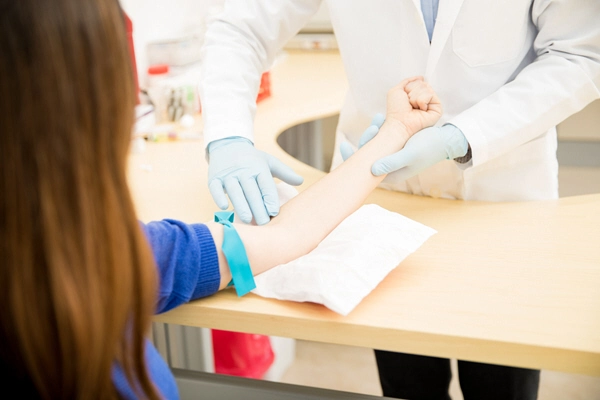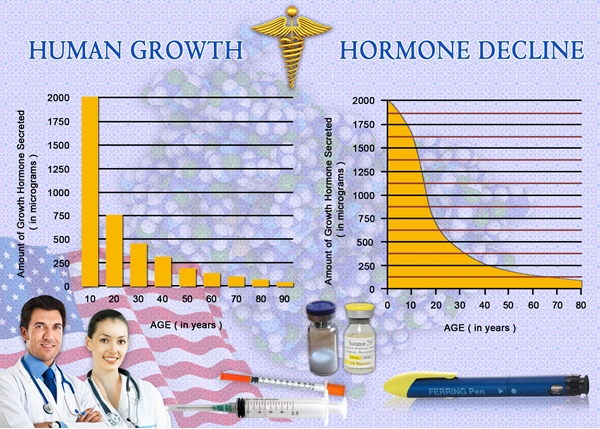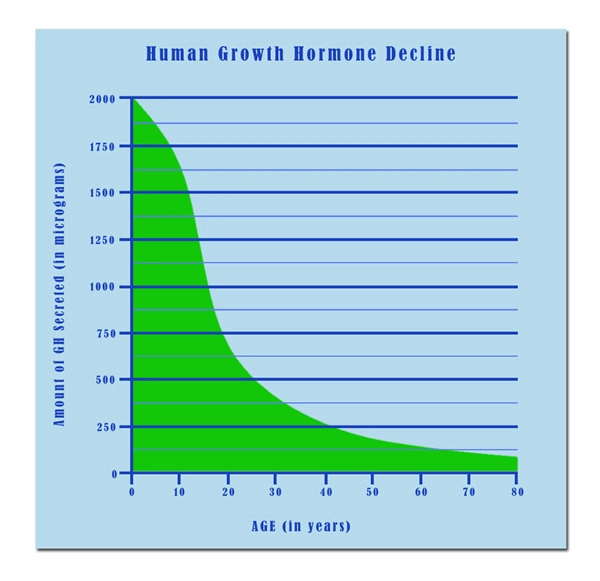Human Growth Hormone (HGH), also known as somatotropin, plays a pivotal role in regulating growth, metabolism, and various physiological processes. The precise measurement of hGH levels is crucial for diagnosing growth disorders, monitoring treatment outcomes, and advancing our understanding of endocrinology. This research article explores the significant advancements in human growth hormone research, focusing on the development of a Radio-Immunoassay (RIA) for precise hGH measurement. Immunological techniques and methods have revolutionized the field, enabling scientists to detect and quantify hGH levels with remarkable accuracy, contributing to improved patient care and scientific insights.
Introduction:
Human Growth Hormone (hGH) is a polypeptide hormone secreted by the anterior pituitary gland. It plays a critical role in regulating growth during childhood and adolescence and influences various physiological processes, including metabolism and immune function, throughout life. Accurate measurement of hGH levels is essential for diagnosing growth disorders, evaluating the efficacy of therapeutic interventions, and studying its role in health and disease.
The development of immunological methods and techniques has significantly advanced the field of hGH research, with the Radio-Immunoassay (RIA) being one of the most important innovations. This article explores the historical context, principles, and applications of RIA in hGH research, highlighting its role in advancing our understanding of this vital hormone.
Immunological Techniques in hGH Research:
Immunological techniques are based on the specificity of antigen-antibody interactions, allowing the detection and quantification of analytes with high sensitivity and precision. In hGH research, various immunological techniques have been employed, including Enzyme-Linked Immunosorbent Assays (ELISA), Radio-Immunoassays (RIA), and Immunofluorescence assays.
Provocative GH testing is used to confirm the diagnosis of GH insufficiency in adults and children. When measuring GH levels in human serum, many commercially available immunoassays produce findings that are mainly inconsistent. These differences cast questions on the applicability of recommended cut-off levels for GH provocative testing. Researchers have created an immunofunctional test approach that enables quantification of just those circulating GH forms that have both of the hormone's binding sites for its receptors and may, thus, start a biological signal in the targeted cells.
A monoclonal anti-hGH antibody that recognizes hGH's binding site 2 is immobilized and utilized to extract the hormone from a serum sample. In a second incubation stage, biotin-labeled recombinant GH-binding protein combines with those hGH molecular isoforms that have both receptor binding sites. After a brief third incubation step with tagged streptavidin, the signal is recognized. The test has an average inter- and intraassay accuracy of 10.3% and 7.3%, respectively, and is sensitive (detection range, 0.1-100 micrograms/L). In this immunofunctional test, placental lactogen does not impede any measurable cross-reaction, and endogenous GH-binding protein does not affect the hGH result. By comparing the findings of the immunofunctional test to the RIA, the percentage of immunofunctionally active hGH forms in blood samples ranged from 52 to 93%. [1]
Radio-Immunoassay (RIA) for hGH:
RIA is a groundbreaking immunological method that revolutionized the measurement of hGH levels. Developed in the late 1950s by Solomon Berson and Rosalyn Yalow, RIA utilizes the competitive binding of a radiolabeled antigen (hGH) and an unlabeled antigen (sample) to specific antibodies immobilized on a solid phase. The radioactivity of the labeled antigen is inversely proportional to the concentration of unlabeled antigen in the sample.
The precision, accuracy, and sensitivity of an activated charcoal-based radioimmunoassay for measuring human growth hormone are presented. Results for growth hormone levels in plasma taken during glucose tolerance tests in patients with acromegaly and during insulin-induced hypoglycemia in individuals of short height are provided. Growth hormone levels in cerebral fluid and extracts of pituitary tumors were measured using this technique. Patients without acromegaly had CSF fluid in which no growth hormone was found. Growth hormone concentration in CSF fluid was quantifiable in acromegaly patients, and it was noticeably raised in one patient who had extracellular expansion of a pituitary tumor. Growth hormone was present in extremely minute amounts in extracts from pituitary tumors from chromophobes. Concentrations were either under or within the normal range in extracts of pituitary tumors taken from acromegalic individuals. [2]
Principles of RIA:
Radiolabeled Antigen: In RIA for hGH, synthetic hGH molecules are radiolabeled with a radioactive isotope such as iodine-125 (^125I). This labeled hGH competes with endogenous hGH in the patient's sample for binding to specific antibodies.
Antibodies: Monoclonal or polyclonal antibodies are used to bind to hGH selectively. These antibodies are immobilized onto a solid phase, such as a test tube or microplate well.
Competition: The patient's serum or plasma containing unknown hGH levels is added to the system. As both radiolabeled and unlabeled hGH compete for antibody binding sites, the amount of radiolabeled hGH bound to antibodies inversely correlates with the concentration of unlabeled hGH in the sample.
Detection: After separating the bound and free fractions, the radioactivity of the bound radiolabeled hGH is measured using a gamma counter. A higher radioactivity signal indicates lower concentrations of unlabeled hGH in the sample.
Applications of RIA in hGH Research:
Clinical Diagnosis: RIA has been invaluable in diagnosing growth hormone disorders, such as dwarfism and gigantism. It allows for the precise measurement of hGH levels in patients, aiding in the selection of appropriate treatment strategies.
Monitoring Growth Hormone Replacement Therapy: RIA is used to monitor the response of patients receiving growth hormone replacement therapy. Regular hGH measurements help physicians adjust treatment regimens to optimize growth outcomes.
Research and Studies: RIA has enabled researchers to investigate the regulation and physiology of hGH in health and disease. It has been pivotal in understanding the roles of hGH in metabolism, tissue repair, and aging.
Conclusion:
Advancements in human growth hormone research, particularly the development of Radio-Immunoassay (RIA), have significantly improved our ability to measure hGH levels with precision and sensitivity. RIA has played a crucial role in diagnosing growth disorders, monitoring treatment outcomes, and advancing our understanding of hGH's roles in various physiological processes. As technology continues to evolve, new immunological methods and techniques will likely further enhance our knowledge of hGH, ultimately benefiting patient care and scientific research. The future of hGH research holds promise for improved diagnostics and therapies for growth-related conditions and a deeper understanding of this essential hormone's functions in the human body.

- Human Growth Hormone Injections In Cheyenne [Last Updated On: February 3rd, 2025] [Originally Added On: October 19th, 2018]
- Human Growth Hormone Injections In Madison [Last Updated On: February 9th, 2025] [Originally Added On: October 19th, 2018]
- Human Growth Hormone Injections In Vancouver [Last Updated On: February 24th, 2025] [Originally Added On: October 19th, 2018]
- Human Growth Hormone Injections In Tacoma [Last Updated On: February 25th, 2025] [Originally Added On: October 19th, 2018]
- Human Growth Hormone Injections In Spokane [Last Updated On: February 26th, 2025] [Originally Added On: October 19th, 2018]
- Human Growth Hormone Injections In Bellevue [Last Updated On: February 26th, 2025] [Originally Added On: October 19th, 2018]
- Human Growth Hormone Injections In Richmond [Last Updated On: February 9th, 2025] [Originally Added On: October 19th, 2018]
- Human Growth Hormone Injections In Portsmouth [Last Updated On: February 10th, 2025] [Originally Added On: October 19th, 2018]
- Human Growth Hormone Injections In Norfolk [Last Updated On: February 10th, 2025] [Originally Added On: October 19th, 2018]
- Human Growth Hormone Injections In Hampton [Last Updated On: March 27th, 2025] [Originally Added On: October 19th, 2018]
- Human Growth Hormone Injections In Chesapeake [Last Updated On: March 27th, 2025] [Originally Added On: October 19th, 2018]
- Human Growth Hormone Injections In Alexandria [Last Updated On: March 28th, 2025] [Originally Added On: October 19th, 2018]
- Human Growth Hormone Injections In Montpelier [Last Updated On: February 11th, 2025] [Originally Added On: October 19th, 2018]
- Human Growth Hormone Injections In Provo [Last Updated On: February 11th, 2025] [Originally Added On: October 19th, 2018]
- Human Growth Hormone Injections In Waco [Last Updated On: February 16th, 2025] [Originally Added On: October 19th, 2018]
- Human Growth Hormone Injections In Richardson [Last Updated On: February 14th, 2025] [Originally Added On: October 19th, 2018]
- Human Growth Hormone Injections In Plano [Last Updated On: February 15th, 2025] [Originally Added On: October 19th, 2018]
- Human Growth Hormone Injections In Pasadena [Last Updated On: February 13th, 2025] [Originally Added On: October 19th, 2018]
- Human Growth Hormone Injections In Midland [Last Updated On: February 16th, 2025] [Originally Added On: October 19th, 2018]
- Human Growth Hormone Injections In Mesquite [Last Updated On: February 13th, 2025] [Originally Added On: October 19th, 2018]
- Human Growth Hormone Injections In McKinney [Last Updated On: February 12th, 2025] [Originally Added On: October 19th, 2018]
- Human Growth Hormone Injections In McAllen [Last Updated On: February 17th, 2025] [Originally Added On: October 19th, 2018]
- Human Growth Hormone Injections In Lubbock [Last Updated On: February 15th, 2025] [Originally Added On: October 19th, 2018]
- Human Growth Hormone Injections In Lewisville [Last Updated On: February 14th, 2025] [Originally Added On: October 20th, 2018]
- Human Growth Hormone Injections In Laredo [Last Updated On: February 12th, 2025] [Originally Added On: October 20th, 2018]
- Human Growth Hormone Injections In Killeen [Last Updated On: February 18th, 2025] [Originally Added On: October 20th, 2018]
- Human Growth Hormone Injections In Irving [Last Updated On: February 19th, 2025] [Originally Added On: October 20th, 2018]
- Human Growth Hormone Injections In Garland [Last Updated On: February 20th, 2025] [Originally Added On: October 20th, 2018]
- Human Growth Hormone Injections In Denton [Last Updated On: February 21st, 2025] [Originally Added On: October 20th, 2018]
- Human Growth Hormone Injections In Carrollton [Last Updated On: February 17th, 2025] [Originally Added On: October 20th, 2018]
- Human Growth Hormone Injections In Brownsville [Last Updated On: February 21st, 2025] [Originally Added On: October 20th, 2018]
- Human Growth Hormone Injections In Beaumont [Last Updated On: February 18th, 2025] [Originally Added On: October 20th, 2018]
- Human Growth Hormone Injections In Austin [Last Updated On: February 22nd, 2025] [Originally Added On: October 20th, 2018]
- Human Growth Hormone Injections In Arlington [Last Updated On: February 20th, 2025] [Originally Added On: October 20th, 2018]
- Human Growth Hormone Injections In Amarillo [Last Updated On: February 19th, 2025] [Originally Added On: October 20th, 2018]
- Human Growth Hormone Injections In Abilene [Last Updated On: February 22nd, 2025] [Originally Added On: October 20th, 2018]
- Human Growth Hormone Injections In Nashville [Last Updated On: February 27th, 2025] [Originally Added On: October 20th, 2018]
- Human Growth Hormone Injections In Murfreesboro [Last Updated On: February 27th, 2025] [Originally Added On: October 20th, 2018]
- Human Growth Hormone Injections In Memphis [Last Updated On: February 28th, 2025] [Originally Added On: October 20th, 2018]
- Human Growth Hormone Injections In Knoxville [Last Updated On: February 28th, 2025] [Originally Added On: October 20th, 2018]
- Human Growth Hormone Injections In Clarksville [Last Updated On: March 1st, 2025] [Originally Added On: October 20th, 2018]
- Human Growth Hormone Injections In Chattanooga [Last Updated On: March 1st, 2025] [Originally Added On: October 20th, 2018]
- Human Growth Hormone Injections In Erie [Last Updated On: March 29th, 2025] [Originally Added On: October 20th, 2018]
- Human Growth Hormone Injections In Allentown [Last Updated On: March 28th, 2025] [Originally Added On: October 20th, 2018]
- Human Growth Hormone Injections In Salem [Last Updated On: March 2nd, 2025] [Originally Added On: October 20th, 2018]
- Human Growth Hormone Injections In Portland [Last Updated On: March 2nd, 2025] [Originally Added On: October 20th, 2018]
- Human Growth Hormone Injections In Gresham [Last Updated On: March 3rd, 2025] [Originally Added On: October 20th, 2018]
- Human Growth Hormone Injections In Eugene [Last Updated On: March 3rd, 2025] [Originally Added On: October 20th, 2018]
- Human Growth Hormone Injections In Tulsa [Last Updated On: March 4th, 2025] [Originally Added On: October 20th, 2018]
- Human Growth Hormone Injections In Norman [Last Updated On: March 4th, 2025] [Originally Added On: October 20th, 2018]
- Human Growth Hormone Injections In Toledo [Last Updated On: February 5th, 2025] [Originally Added On: October 20th, 2018]
- Human Growth Hormone Injections In Dayton [Last Updated On: February 7th, 2025] [Originally Added On: October 20th, 2018]
- Human Growth Hormone Injections In Columbus [Last Updated On: February 7th, 2025] [Originally Added On: October 20th, 2018]
- Human Growth Hormone Injections In Akron [Last Updated On: February 8th, 2025] [Originally Added On: October 20th, 2018]
- Human Growth Hormone Injections In Paterson [Last Updated On: February 23rd, 2025] [Originally Added On: October 20th, 2018]
- Human Growth Hormone Injections In Reno [Last Updated On: February 24th, 2025] [Originally Added On: October 20th, 2018]
- Human Growth Hormone Injections In Henderson [Last Updated On: February 25th, 2025] [Originally Added On: October 20th, 2018]
- Human Growth Hormone Injections In Omaha [Last Updated On: February 4th, 2025] [Originally Added On: October 20th, 2018]
- Human Growth Hormone Injections In Lincoln [Last Updated On: February 4th, 2025] [Originally Added On: October 20th, 2018]
- Human Growth Hormone Injections In Billings [Last Updated On: February 5th, 2025] [Originally Added On: October 20th, 2018]
- Human Growth Hormone Injections In Springfield [Last Updated On: February 6th, 2025] [Originally Added On: October 20th, 2018]
- Human Growth Hormone Injections In Independence [Last Updated On: April 6th, 2025] [Originally Added On: October 20th, 2018]
- Human Growth Hormone Injections In Columbia [Last Updated On: February 6th, 2025] [Originally Added On: October 20th, 2018]
- Human Growth Hormone Injections In Jackson [Last Updated On: February 8th, 2025] [Originally Added On: October 20th, 2018]
- Human Growth Hormone Injections In Rochester [Last Updated On: February 23rd, 2025] [Originally Added On: October 20th, 2018]
- Human Growth Hormone Injections In Warren [Last Updated On: March 5th, 2025] [Originally Added On: October 20th, 2018]
- Human Growth Hormone Injections In Lansing [Last Updated On: March 5th, 2025] [Originally Added On: October 20th, 2018]
- Human Growth Hormone Injections In Flint [Last Updated On: March 6th, 2025] [Originally Added On: October 20th, 2018]
- Human Growth Hormone Injections In Worcester [Last Updated On: March 29th, 2025] [Originally Added On: October 20th, 2018]
- Human Growth Hormone Injections In Springfield [Last Updated On: March 30th, 2025] [Originally Added On: October 20th, 2018]
- Human Growth Hormone Injections In Lowell [Last Updated On: March 30th, 2025] [Originally Added On: October 20th, 2018]
- Human Growth Hormone Injections In Cambridge [Last Updated On: March 31st, 2025] [Originally Added On: October 20th, 2018]
- Human Growth Hormone Injections In Augusta [Last Updated On: March 6th, 2025] [Originally Added On: October 20th, 2018]
- Human Growth Hormone Injections In Shreveport [Last Updated On: March 7th, 2025] [Originally Added On: October 20th, 2018]
- Human Growth Hormone Injections In Lafayette [Last Updated On: March 7th, 2025] [Originally Added On: October 20th, 2018]
- Human Growth Hormone Injections In Louisville [Last Updated On: March 8th, 2025] [Originally Added On: October 20th, 2018]
- Human Growth Hormone Injections In Lexington [Last Updated On: March 8th, 2025] [Originally Added On: October 20th, 2018]
- Human Growth Hormone Injections In Wichita [Last Updated On: March 9th, 2025] [Originally Added On: October 20th, 2018]
- Human Growth Hormone Injections In Topeka [Last Updated On: March 9th, 2025] [Originally Added On: October 20th, 2018]
- Human Growth Hormone Injections In Olathe [Last Updated On: March 10th, 2025] [Originally Added On: October 20th, 2018]



List of USA state clinics - click a flag below for blood testing clinics.
Word Count: 1017



















































